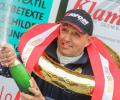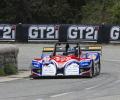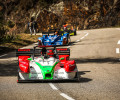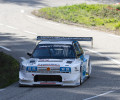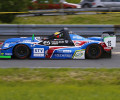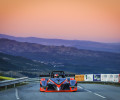EHCC: Tight competition at every stage

Rarely over the past few seasons, can the performances of the main protagonists have been as close as they have been so far this year in the European Hill Climb Championship. At Ecce Homo-Sternberk in the Czech Republic for Round 5 last weekend (3-5 June), the victories in all categories were decided by the tiniest of margins, often less than a second.
At Sternberk, the Ecce Homo Hill Climb is an institution which is now more than 110 years old. The course energises the entire town and the majority of the people who live there, with the paddock flowing around the local sporting complex and the start of the race lying just 400 metres from the town centre. Between these two zones, the competition cars were a constant buzz of comings and goings in the cobbled streets of the town and at the foot of the majestic, centuries-old monastery, which looks across towards the town hall.
The route of the Ecce Homo Hill-Climb starts off virtually in the town centre before wending its way up into the neighbouring forest and, 7.8 kilometres further on, reaching a plateau liberally sprinkled with wind turbines. The route is ideal and presents a fine variety of challenges and bends.
A rookie in the European Championship, the young Paride Macario is in the process of discovering all the courses and swears that he has fallen in love with the Ecce Homo: “This layout is really very interesting, even exhilarating,” he explained after his first two practice climbs. In addition, it really does suit our sport-prototype cars. The quality of the road surface is pretty good, the route is lined with rails over most of its layout, the bends are varied and the higher you go, the greater the rhythm.”
In the Czech Republic, seemingly inspired by the route and the atmosphere of the event, Macario (Osella FA30) achieved his best result of the year and, indeed, of his short international career, by finishing second following a very tight battle, which was decided by a mere handful of tenths of a second, ahead of the Swiss Joël Volluz (Osella FA30).
Macario second, Volluz third. This means, therefore, that just one driver managed to finish ahead of them, and for the first time in a long time it was not Simone Faggioli (Norma M20FC)! The eight-time European Champion had to content himself with fourth place, having fallen victim to electrical failures during the first race climb, which cost him more than ten seconds. All he had left with which to console himself was the best time achieved in the second heat (just four hundredths of a second off his own absolute record for the route set in 2012) and first place in Group E2-SC.
The steady procession of Faggioli’s seven consecutive victories was brought to a halt by Christian Merli (Osella FA30 Evo). Having already achieved the best times in practice, Merli took the first heat and lost out in the second heat by just two tenths of a second. However, over the two legs, Merli won a brilliant final victory, which enabled him to remain atop the provisional classification of the Championship in a perfect tie with Faggioli.
Competing on home ground, the Czechs Jaroslav Janik and David Komarek achieved 5th and 6th places with the Norma M20FC, powered not by the 3-litre normally aspirated engines but rather by an original 1700 turbocharged engine from a Mitsubishi. Their compatriot, Milos Benes, who had a realistic chance of reaching the podium, had to abandon his effort after leaving the road during the first climb, which followed on from the collapse of the rear wing of his Osella FA30. Fausto Bormolini shared the heartbreak of a non-finish after losing control of his Reynard in the second heat and seriously damaging it against the rails running alongside the route, although fortunately he did not suffer any adverse consequences.
Another very close-run battle came in Group E2-SH, where Vladimir Vitver and his Audi TT DTM prevailed by barely one second per timed heat, ahead of Dan Michl and his Lotus Evora V8.
Reserved for closed cars, Category 1 was even more exciting. In Group N, the four best drivers were separated by less than half a second in the second heat. After the two climbs, the young Serb Nikola Miljkovic deservedly won ahead of the Slovak Peter Jurena and the Czechs Tomas Vavrinec and Filip Saljer. The dubious honour of the poorest performance of the entire Czech week-end has to go to the unfortunate Italian Antonio Migliuolo, who was let down by the engine of his Mitsubishi in the first heat.
In Group A, Jaromir Maly notched up his first victory of the season despite facing pressure from the Austrian Christian Schweiger, who finished a mere 0.15s behind Maly in the second heat. Finally, in GT, the gap in the second heat was also less than the second that separated the Lamborghini Gallardo driven by Martin Jerman and the Porsche 997 GT3 of the Austrian Tessitore, the latter prevailing over the two heats.
The next event of the FIA European Hill-Climb Championship will take place in Italy, specifically Ascoli, on 25 and 26 June 2016.

 Facebook
Facebook Twitter
Twitter